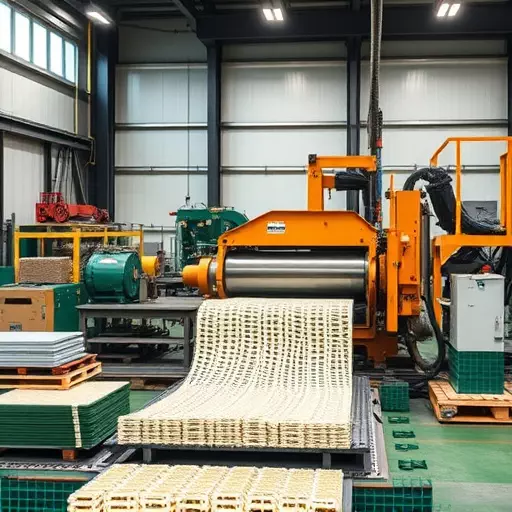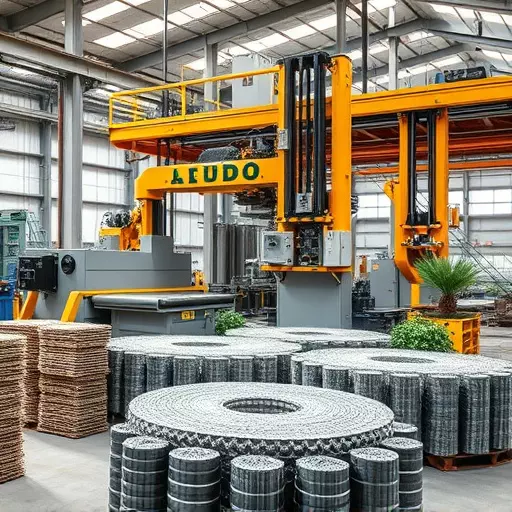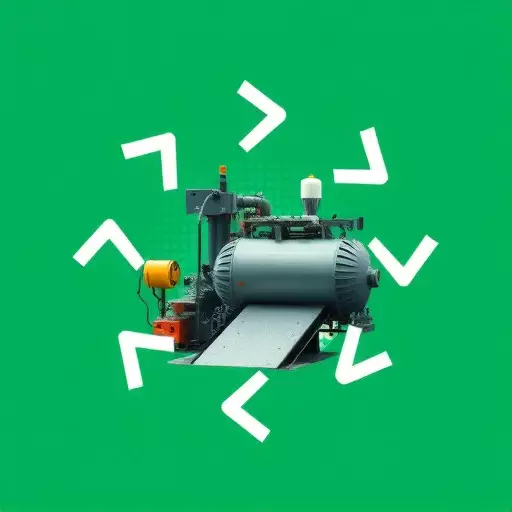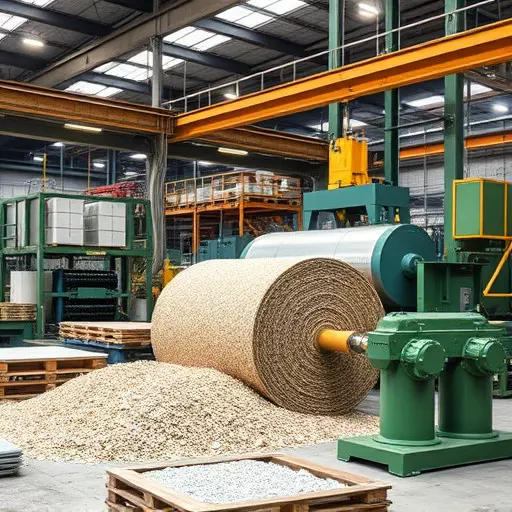Advanced waste sorting technologies in Toledo are revolutionizing sustainable material processing, supporting eco-friendly manufacturing and circular economy principles. These systems precisely categorize materials like plastics, glass, metal, and paper for recycling or disposal, reducing environmental impact and creating economic opportunities by recovering valuable resources. With innovations like optical sorters, magnetic separators, and AI algorithms, Toledo can emulate successful global implementations to become a leader in sustainable waste management, contributing to a greener future through responsible material processing practices. However, challenges include high initial costs and public education needs to ensure proper segregation and market demand for recycled goods.
Waste sorting technologies are revolutionizing the way we manage our resources, paving the way for a more sustainable future. In today’s digital era, understanding and adopting eco-friendly manufacturing practices is crucial for a circular economy. This article delves into the backbone of sustainable material processing—waste sorting systems—exploring their impact on reducing environmental footprints. From common waste categories to emerging technologies and global case studies, we navigate the landscape of eco-conscious material processing, highlighting strategies to overcome challenges and barriers. Discover how advanced sorting technologies are transforming manufacturing while contributing to a greener world.
- Understanding Waste Sorting Technologies: The Backbone of Sustainable Material Processing
- Eco-Friendly Manufacturing: How Advanced Sorting Systems Contribute to a Circular Economy
- Common Waste Stream Categories and Specialized Sorting Techniques
- Innovating for the Future: Emerging Technologies in Waste Sorting
- Case Studies: Successful Implementation of Waste Sorting Technologies Worldwide
- Navigating Challenges and Adoption Barriers for Widespread Eco-Conscious Material Processing
Understanding Waste Sorting Technologies: The Backbone of Sustainable Material Processing

Waste sorting technologies are the unsung heroes in the quest for a more sustainable future. These innovative systems form the backbone of sustainable material processing, revolutionizing how we manage our waste streams and ushering in a new era of eco-friendly manufacturing. By employing advanced techniques like optical sorters, magnetic separators, and robotic arms, these technologies can precisely categorize materials such as plastics, glass, metal, and paper, ensuring they end up in the right recycling or disposal channels.
The adoption of waste sorting technologies aligns perfectly with the goals of the circular economy, where resources are used more efficiently and waste is minimized. In Toledo and other cities worldwide, these technologies are transforming local waste management landscapes, paving the way for a greener and more sustainable future. They not only reduce environmental impact but also create economic opportunities by recovering valuable materials, fostering a closed-loop system that benefits both industries and communities alike.
Eco-Friendly Manufacturing: How Advanced Sorting Systems Contribute to a Circular Economy

Advanced waste sorting technologies play a pivotal role in fostering eco-friendly manufacturing and advancing the circular economy. These sophisticated systems go beyond basic segregation by employing innovative methods to process and categorize materials, ensuring that even complex waste streams are effectively recycled or reused. The integration of advanced sensors, machine learning algorithms, and automation allows for precise identification and separation of various materials, including plastics, glass, metals, and organic compounds.
By facilitating sustainable material processing in Toledo and beyond, these technologies reduce the environmental impact of manufacturing by minimizing the need for virgin resources. They contribute to a closed-loop system where waste becomes valuable feedstock for new products, thereby decreasing greenhouse gas emissions and conserving natural resources. This shift towards eco-friendly manufacturing is crucial in addressing global sustainability challenges and moving towards a circular economy model.
Common Waste Stream Categories and Specialized Sorting Techniques

Waste sorting technologies play a pivotal role in facilitating sustainable material processing in Toledo and beyond, aligning with global efforts to embrace the circular economy. Common waste stream categories include recyclables like paper, plastic, glass, and metal, organic materials, hazardous substances, and general refuse. Each category requires specialized sorting techniques for effective recycling and eco-friendly manufacturing.
For instance, optical sorters use cameras and sensors to identify and separate plastics by type, ensuring higher quality recycled materials. Similarly, advanced magnetic separators extract metals from waste streams, while biological treatment processes break down organic matter into compost or biogas. These innovative solutions not only enhance resource recovery rates but also reduce the environmental impact of waste management, contributing to a more sustainable future for the community and the planet.
Innovating for the Future: Emerging Technologies in Waste Sorting

The future of waste sorting looks promising with emerging technologies that are set to revolutionize sustainable material processing in Toledo and beyond. These innovations are not just about improving efficiency but also transforming the way we approach eco-friendly manufacturing and embracing the circular economy. One such technology is advanced optical sorting, which uses machine learning algorithms to identify and separate materials based on their visual properties. This method enhances precision and speed, allowing for more effective recycling of diverse waste streams.
Additionally, new developments in robotic systems equipped with computer vision are making inroads into complex material separation tasks. These robots can adapt to different objects and their characteristics, ensuring a higher degree of accuracy. As the demand for eco-friendly manufacturing processes increases, these emerging technologies will play a pivotal role in shaping a more sustainable future by reducing waste and promoting the circular economy.
Case Studies: Successful Implementation of Waste Sorting Technologies Worldwide

The successful implementation of waste sorting technologies worldwide showcases the growing commitment to sustainable material processing in Toledo and beyond. Pioneering cities like Amsterdam and Singapore have adopted advanced systems, such as optical sensors and AI-driven algorithms, to automate the sorting process, significantly increasing efficiency and reducing manual labor. These innovative approaches not only streamline recycling but also pave the way for a circular economy by extracting valuable resources from waste streams.
Case studies highlight that these technologies are transforming eco-friendly manufacturing practices. In Germany, for instance, cities like Berlin have integrated smart bins equipped with internet connectivity, enabling real-time monitoring and optimized collection routes. This data-driven approach ensures that materials are processed optimally, reducing contamination and enhancing the quality of recycled products. By emulating such successful implementations, Toledo can position itself as a leader in sustainable waste management, contributing to a greener and more prosperous future through responsible material processing.
Navigating Challenges and Adoption Barriers for Widespread Eco-Conscious Material Processing

Navigating the challenges of implementing eco-conscious waste sorting technologies is a key hurdle for widespread adoption of sustainable material processing in Toledo and beyond. While the benefits of the circular economy are undeniable, transitioning from traditional linear models to a more holistic approach requires addressing significant barriers. One major challenge lies in the initial investment required to acquire and integrate advanced sorting equipment into existing infrastructure. This financial burden can deter both businesses and municipalities, especially smaller operations with limited resources.
Additionally, ensuring proper segregation and quality of recycled materials remains a complex task. Educational campaigns and public awareness initiatives are crucial to encourage responsible waste generation at the source. Furthermore, establishing robust markets for recycled goods is essential to incentivize eco-friendly manufacturing practices and create a compelling business case for adopting these technologies on a larger scale.


